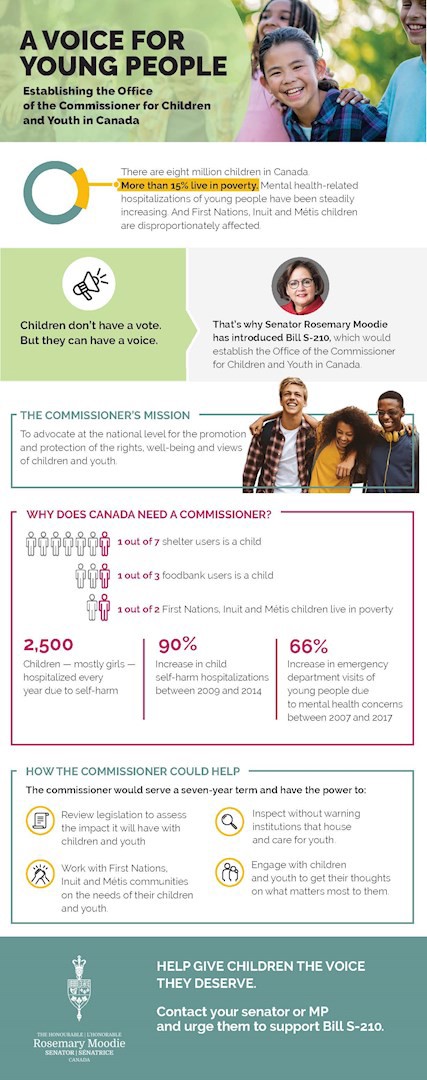A Commissioner for Children and Youth in Canada

Read the full report here
Youth Engagement on Bill S-210
Canada has been steadily dropping in global rankings over the past decade with respect to the well-being of our children.
What can the Government of Canada do to advance the health and well-being of children and youth? The answer lies in an independent federal Commissioner for Children and Youth.
The survey consultation is now completed, but the reasons behind this engagement and the continued engagement of young people in policy areas that affect their well-being and future continue to be relevant.
WHY THIS IS URGENTLY NEEDED
CANADA RANKS (OUT OF 38 RICH COUNTIRES)
CHILDREN NEED A VOICE
- Hospitalization due to self-harm increased 90% between 2009-2014.
- More than 1/3 of young people experience discrimination.
- 1/3 of young Canadians do not enjoy a safe and healthy childhood.
- 50% of First Nations children living on-reserve live in poverty.
- 1 in 4 children with disabilities lives in poverty.
- 30th overall
- 31st in mental health and happiness
- 30th in physical health and survival
- 33rd in immunization rates
- 29th in obesity
- 31st in infant mortality (4.7/1000 births)
- 18th in education and skills development
- 26th in child poverty rates
22% of Canadians, nearly 8 million, are children. Each should be able to live in conditions of optimal social, physical, mental, cultural and spiritual development. It is their right. These statistics are not acceptable.
In June of 2020, Senator Moodie introduced a bill to establish an office of a Commissioner for Children and Youth. She reintroduced this bill in the fall of 2020. This legislation’s design and approach is supported by 18 months of research and engagement with various actors from within Canada and in other jurisdictions.
A Commissioner for Children and Youth was a central recommendation of a 2007 report by the Senate Human Right’s Committee and before then, and ever since then, many stakeholders, activists and politicians have called on the government to establish a Commissioner for Children and Youth.
The bills envision an office lead by a Principal Commissioner as well as Assistant Commissioners who could be tasked to focus on specific groups, such as First Nations, Métis and Inuit’s peoples or immigrant and refugees. We envision the office taking a distinction-based approach, wherein it does not view populations as a monolith but considers the diverse needs, cultures and histories of the people it serves.
This bill has received the endorsement of multiple organizations that serve and support children and youth in Canada.
This type of office exists in most provinces and territories and in many international jurisdictions including Belgium, Australian, New-Zealand, Sweden and Norway. Though it would not deal with specific local issues, it would serve as a liaison between local authorities and the federal government.
The commissioner's 3 main duties:
- Evaluate and report on government actions including legislation and regulatory changes. The Commissioner would assess the impact of Government action on children and youth.
- Advocate for the well-being of children and youth, including championing certain issues or conducting studies to highlight the needs of specific populations or the impact of specific events or issues.
- Engage with children and youth to elevate their voices and provide a platform for engagement with Parliamentarians.
This is an idea that has been discussed for many decades; there has even been a Senate report that made this recommendation:
- Many in Canadian politics have suggested it, including MP Anne Quach last year, before she stepped down.
- Former justice Minister Cotler, Minister Garneau, former MPs Leitch and Quach all introduced bills to create this office when they were in opposition.
- The Inquiry on Missing and Murdered Indigenous Women’s call for justice 12.9 calls for a federal commissioner.
- The Child Commissioner is an office that has been suggested to us by the United Nations for over 20 years. Canada’s implementation of the Convention of the rights of the child is up for review in 2020 and this has been an important deficit for a long time.

